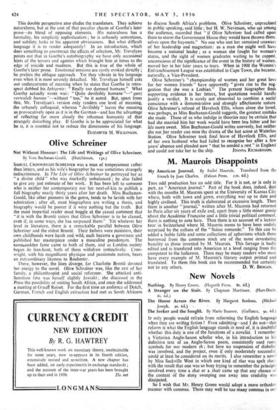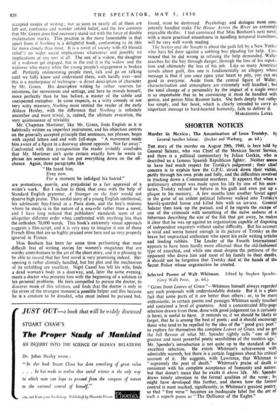New Novels -
The Seeker and the Sought. By Marie Baumer. (Gollancz. gs. 6d.)
IF only people would refrain from reforming the English language when they are writing fiction I Even admitting—and I do not-'-that reform is what the English language stands in need of, it is doubtful whether this duty is one of the functions of a novelist. I remember a Victorian Anglo-Saxon scholar who, in his introduction to his definitive text of an Anglo-Saxon poem, consistently used runic symbols for our modern tit ; but here no suspension of disbelief was involved, and the project, even if only moderately successful, could at least be considered on its merits. I also remember a novel by Miss Sackville West in which one kind of that was spelt that!, with the result that one was so busy trying to remember the principle involved every time a that or a than came up that any chance of the content of the story sweeping one away into credulity was dissipated.
So I wish that Mr. Henry Green would adopt a more orthodox manner with commas. There may well be too many commas in our accepted modes of writing ; but as soon as nearly all of them are left out, confusion and wonder inhibit belief, and the few commas that Mr. Green does find necessary stand out with the force of double exclamation marks. This practice is the more lamentable in that apart from it Nothing is a delightful book, conforming to its title far more closely than most. It is a novel of society with (O blessed relief!) no wider social implications whatsoever and possibly no implications of any sort at all. The son of a widow, the daughter of a widower get engaged, but in the end it is the widow and the widower who marry while the young people's engagement is broken off. Perfectly uninteresting people meet, talk and go on talking until we fully know and understand them, with hardly ever—and this is a masterpiece of technique—a direct description of character by Mr. Green. His descriptive writing he rather reserves for intuitions, for movements and settings, and here he reveals himself, more perfectly than he has before, a master of the subtle and unexpected metaphor. In some respects, as a witty comedy of not very witty manners, Nothing must remind the reader of the early Aldous Huxley, with the difference that Nothing is infinitely smoother and more trivial, is, indeed, the ultimate evocation, the very quintessence of triviality.
Mr. Chapman Mortimer, like Mr. Green, finds English as it is habitually written an imperfect instrument, and his objection centres on the generally accepted principle that sentences, not phrases, begin with capital letters and end with full-stops. " A movement made him aware of a figure in a doorway almost opposite. Not far away." Confronted with this juxtaposition the reader irritably concludes that Mr. Mortimer isn't quite certain exactly how he wants to phrase his sentence and so has put everything down on the off- chance. Again, three paragraphs like "He hated him.
Even now.
For a moment he indulged his hatred."
are pretentious, puerile, and prejudicial to a fair appraisal of a writer's work. But I incline to think that even with the help of Standard English grammar, A Stranger on the Stair would not deserve high praise. This sordid story of a young English intellectual, his adolescent boy-friend in a Paris slum, and the boy's mistress whom he steals is in the nature of a nouvelle rather than a novel, and I have long noticed that publishers' standards seem of an altogether different order when confronted with anything less than the orthodox 70,000 words. This book's extremely visual approach suggests a film-script, and it is very easy to imagine it one of those French films that are so highly praised over here and so very properly ignored in France.
Miss Bonham has been for some time performing that most difficult feat of writing stories for women's magazines that are worthy contributions to the art of the short story, and it is pleasing to be able to record that her first novel is very promising indeed. Her opening is rather clumsily handled, but her plot and the mechanism of its unfolding are excellent. Nigel Cassel has left his wife, finds a dead woman's body in a doorway, and, later the same evening, meets a doctor who presents him with the beginning of a solution to his personal problems. He feels compelled to pursue the doctor, to discover more of this solution, and finds that the doctor is only in the stress of the strangest moment a possible helper and this because he is a creature to be dreaded, who must indeed be pursued but, found, must be destroyed. Psychology and dialogue most com- petently handled make The House Across the River an extremely enjoyable thriller. I feel convinced that Miss Bonham's next novel, with a more practised smoothness in handling temporal transitions, will be very well worth reading.
The Seeker and the Sought is about the guilt felt by a New Yorker who bars hig' door against a sobbing boy pleading for help. Con- vinced that he did wrong in refusing the help demanded, Walter searches for the boy through danger, through the loss of his reputa- tion and ultimately the loss of his job. Like so many American novels about guilt, this one is fundamentally an allegory whose message is that if you once open your heart to pity, you can see good in everyone. Aside from the central figure of Walter, characterisation and atmosphere are extremely well handled ; but the total change of a personality by the impact of a single event is so improbable that to be convincing it must be handled with genius, and genius Miss_Baumer lacks. She feels deeply but rather too simply, and her book, which is clearly intended to carry an important message to hard-hearted humanity, fails to deliver it.
MARGHANITA LASKI.







































 Previous page
Previous page